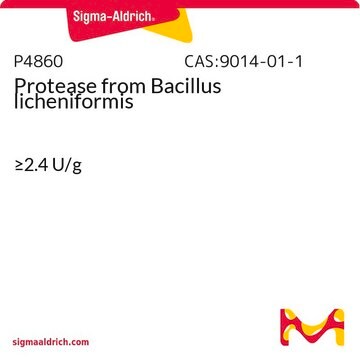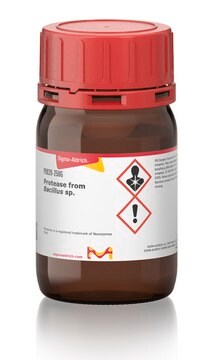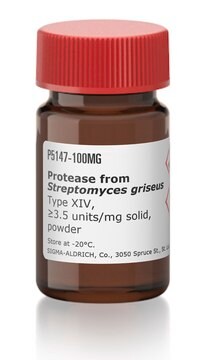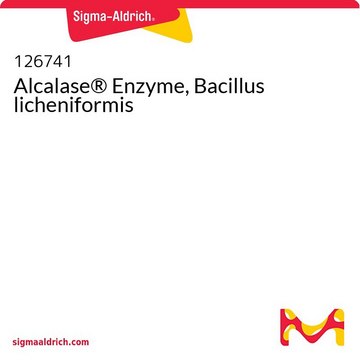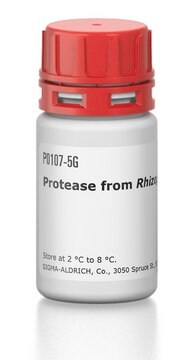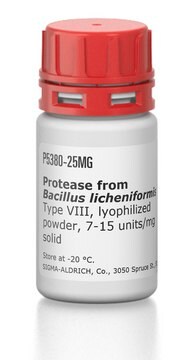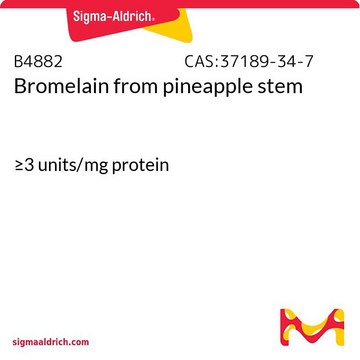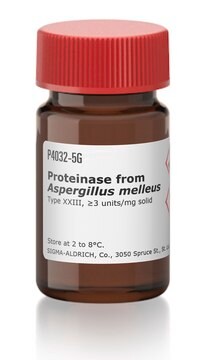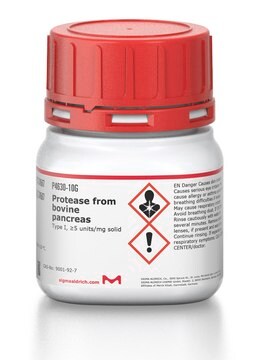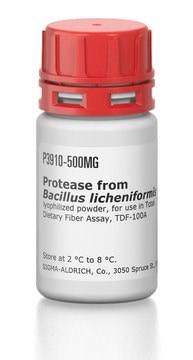P6110
Protease from Aspergillus oryzae
≥500 U/g
Synonim(y):
Flavourzyme®
Zaloguj sięWyświetlanie cen organizacyjnych i kontraktowych
About This Item
Polecane produkty
Formularz
liquid
aktywność właściwa
≥500 U/g
temp. przechowywania
2-8°C
Opis ogólny
Fungal protease/peptidase complex produced by submerged fermentation of a selected strain of Aspergillus oryzae and contains both endoprotease and exopeptidase activities.
Proteases belong to the group of hydrolases and exist as acid, neutral, and alkaline proteases.
Zastosowanie
Protease from Aspergillus oryzae has been used:
- to study the effect of protease inhibitors from Moringa oleifera
- to evaluate its hydrolyzing effect on the anatomical structure and chemical composition of archaeological wood samples
- to perform protease digestion to process mucosa samples obtained from the colon of pigs
Protease is used to degrade proteins, to study protease inhibitors and to study thermal inactivation kinetics. Protease is used in nucleic acid isolation procedures in incubations. It has been injected into flies with a nanoject apparatus for infection and survival experiments.
The enzyme from Sigma has been used in the semi-purification of mouse colorectal mucins during protein digestion.
Działania biochem./fizjol.
Proteases catabolize proteins by hydrolysis of peptide bonds. They have many applications such as in detergents, bioremediation processes, pharmaceutical industry, and food industries. Proteases are associated with nitrogen mineralization in the soil. They also serve as a supplement in swine and poultry diets.
Definicja jednostki
One unit is the amount of enzyme which hydrolyzes 1 mmol of L-Ieucine-p-nitroanilide per minute.
Informacje prawne
A product of Novozyme Corp.
Flavourzyme is a registered trademark of Novozymes Corp.
Ta strona może zawierać tekst przetłumaczony maszynowo.
Hasło ostrzegawcze
Danger
Zwroty wskazujące rodzaj zagrożenia
Zwroty wskazujące środki ostrożności
Klasyfikacja zagrożeń
Acute Tox. 4 Oral - Aquatic Acute 1 - Aquatic Chronic 2 - Eye Dam. 1 - Resp. Sens. 1 - Skin Irrit. 2 - STOT SE 3
Organy docelowe
Respiratory system
Kod klasy składowania
10 - Combustible liquids
Klasa zagrożenia wodnego (WGK)
WGK 2
Środki ochrony indywidualnej
dust mask type N95 (US), Eyeshields, Faceshields, Gloves
Wybierz jedną z najnowszych wersji:
Masz już ten produkt?
Dokumenty związane z niedawno zakupionymi produktami zostały zamieszczone w Bibliotece dokumentów.
Klienci oglądali również te produkty
J Morgan Knight et al.
Methods in molecular biology (Clifton, N.J.), 1799, 1-9 (2018-06-30)
Allergic airway diseases (asthma and chronic rhinosinusitis) are among the most common of all human diseases in heavily industrialized societies. Animal models of asthma have provided remarkable insight into allergic disease pathogenesis and will continue to drive the discovery of
Jelena Patrnogic et al.
PloS one, 12(12), e0188339-e0188339 (2017-12-07)
In Drosophila, recognition of pathogens such as Gram-positive bacteria and fungi triggers the activation of proteolytic cascades and the subsequent activation of the Toll pathway. This response can be achieved by either detection of pathogen associated molecular patterns or by
Sunantha Ketnawa et al.
Chemistry Central journal, 7(1), 79-79 (2013-05-02)
Too many different protein and enzyme purification techniques have been reported, especially, chromatographic techniques. Apart from low recovery, these multi-step methods are complicated, time consuming, high operating cost. So, alternative beneficially methods are still required. Since, the outstanding advantages of
Refined methodology to purify mucins from pig colonic mucosa
Libao-Mercado AJ and De Lange CFM
Livestock Science, 109(1-3), 141-144 (2007)
Hydrolases of Halophilic Origin With Importance for the Food Industry
Enzymes in Food Biotechnology, 93-109 (2019)
Nasz zespół naukowców ma doświadczenie we wszystkich obszarach badań, w tym w naukach przyrodniczych, materiałoznawstwie, syntezie chemicznej, chromatografii, analityce i wielu innych dziedzinach.
Skontaktuj się z zespołem ds. pomocy technicznej